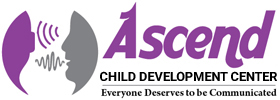The goal of speech therapy is simple — improved skills that will lead to more effective and confident communication. The therapists at Ascend know how important communication is. It is essential to our everyday lives be it a presentation in the board room to a conversation with a loved one. Our ultimate goal is to make each communication encounter successful.
Evaluation and Treatment
Communication is essential for achieving success at work or school, and building relationships.Evaluation of an adults communication is conducted using both informal and formal measures. Ascend’s therapists work with the client to determine areas of communication growth, and establishes tangible goals and a treatment plan to help achieve those goals.
From clear speech Ascends to well articulated thoughts, our team is here to help you achieve your goals.
Our services include:
- Articulatory errors
- Dysarthria
- Apraxia of speech
- Expressive/Receptive language: traumatic brain injury or stroke
- Language Processing
- Listening skills for adults with hearing loss/cochlear implants
- Stuttering
- Voice disorders
- Transgender voice
Comprehensive evaluation and treatment options are offered in the following areas.
- Aphasia – receptive or expressive language disorder, apraxia, dysarthria that may have been a result of a neurologic disease or disorder, stroke, or traumatic brain injury.
- Cognitive and Executive Function Disorders – decreased ability to complete higher level thought processes which may include short term memory, reasoning, judgment, multi-tasking, and organization.
- Fluency/Stuttering – disorder of the flow of one’s speech that may be characterized by repetitions or blocking of Ascend, words, or phrases, irregular pattern of breathing or pausing, possible physical gestures in coordination of speech production and may manifest in frustration, depression and avoidance behaviors.
- Voice Disorders – disorder of the voice that may include hoarseness, harshness, breathiness, lack of voice, improper pitch or loudness levels, and/or difficulty projecting the voice.

